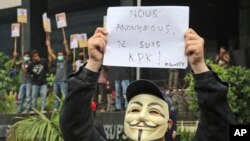The tug-of-war over the corruption trial of Indonesia's speaker of the House of Representatives, Setya Novanto, is testing the mettle of the Corruption Eradication Commission (KPK). Long rated the country's most trusted institution, the KPK has a continuous uphill struggle to undo the deeply entrenched corruption of the Suharto era. The dictator embezzled over $35 billion over his 32-year reign.
Novanto has been linked to at least eight different corruption cases, but his imminent court appearance will be the first of his political life, which started in 1998, the same year modern Indonesia emerged from the Suharto dictatorship.
The difficulty of getting Novanto to even show up in court is a testament to the challenge of accountability in modern Indonesia. He is implicated in what is known as the “e-KTP” scandal, referring to electronic ID cards. Novanto is accused of graft for demanding a 10 percent cut from a company with a government contract to make the cards.
On April 10, the KPK banned Novanto from leaving the country while they investigated his involvement. A day later, a KPK investigator named Novel Baswedan was partially blinded in an acid attack. Novanto publicly disavowed any connection between the events.
Novanto, who made an appearance on Donald Trump’s 2016 campaign trail, has challenged his status as a target in South Jakarta District Court and checked into a hospital for what he claimed was vertigo related to playing ping pong, a move that was widely ridiculed on social media. He was briefly cleared, but the KPK bounced back, saying he will still be called to testify, along with six other suspects, this year.
The Teflon speaker
Novanto’s charges were suspended last month because a judge ruled that the KPK moved too quickly between a preliminary and advanced investigation. But the KPK has said it has “no shortage of evidence” on which to charge Novanto, and seems geared for a long fight.
The scale of the e-KTP affair is tidy in relation to a later extortion case involving Novanto that is considered one of the biggest corruption scandals in modern Indonesia. In 2015, he was recorded asking the director of the Freeport mining company for $4 billion in company shares in exchange for a contract extension.
Novanto resigned from his position as Speaker of the House, but then sued the Energy Minister who reported him for defamation under Indonesia’s controversial defamation law. The tape of Novanto’s extortion attempt was ruled inadmissible evidence because it was recorded in private, and the charges were dropped. Novanto returned to his post last November, cementing his reputation as a politician above the law.
His evasion of his court date last month spawned a spate of memes on “#thepowerofSetNov,” spoofing his seeming untouchability.
Commission under stress
The KPK, founded in 2002, has a nearly 100-percent conviction rate, although it has pursued fewer than 100 cases out of the thousands reported to it each year. Its mandate as an independent, extra-governmental body has been consistently challenged by members of Parliament, and it faced a 26 percent budget cut this year.
“President Jokowi is still committed to support and strengthen the KPK,” said presidential spokesperson Johan Budi. “With regards to the budget cut, it has happened for many ministries and government institutions, at different rates. Budget cuts are a national policy,” he said, meaning that they are decided in the House, not the executive branch, “and they are not related to the President's support for KPK.”
Public support also remains high, and the acid attack on Novel Baswedan has cemented the Commission’s image as a tireless advocate for good governance.
There have been pro-KPK demonstrations all across Indonesia, like in Kupang, East Nusa Tenggara, where students stopped traffic to show support for the graft case against Novanto.
“The pre-trial ruling says more about Setya Novanto's ability to play the courts than KPK's weakness,” said Marcus Mietzner, an Indonesian politics expert at Australian National University. “The KPK itself is split, but this had nothing to do with the verdict; rather, the KPK is internally undermined by the fight between reformist civilians and conservative police elements. Thus far, the former still have the upper hand, but in the long term, this could change.”
If KPK itself decides to drop the Novanto case, he said, it would be a sign that power within the KPK is shifting towards the conservatives.
On the other hand, he said, “a successful indictment of Novanto would take out one of the most central figures of Indonesia's political patronage system — but that system itself would adapt quickly.”







